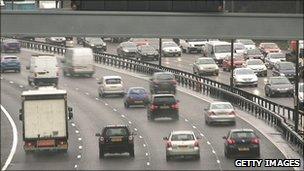Transport group opposes construction of new roads
- Published

Transport projects are set to be affected by the government's spending review
The government should maintain the existing road network rather than extend it, the Chartered Institute of Logistics and Transport has said.
It said this would be a better use of resources at a time of government cuts.
The comments come after a survey of its 1,244 members found only 24% wanted more roads being built, while 61% would like extra rail services.
But motoring organisations, such as the AA and RAC, said road improvements needed to be made for the future.
With the government's October spending review expected to cut transport spending, the Chartered Institute of Logistics and Transport said the remaining transport budget should be targeted at supporting economic growth or reducing congestion.
Its survey suggested 70% of members backed more congestion-charging as a way for the government to raise new revenues, with 39% supportive of cutting concessions, such as free travel passes for pensioners.
Others said they would support cutting spending on rural transport services (46%), and health and safety budgets (44%).
The institute - a professional body for people working in the logistics, supply chain and transport industries - said its members were also in favour of increased efforts to change travel behaviour for environmental reasons, such as the further promotion of car-sharing and cycling.
Some 55% wanted to see more government spending to help cut the carbon emissions of the transport industry.
And nearly 80% of respondents were in favour of the proposed high-speed rail link between London and Birmingham, although some of the respondents said the project should be delayed.
Institute president Sir Moir Lockhead said: "No one likes to see the transport budget cut, but in the current conditions it's inevitable that savings are going to have to be made."
'Voter priority'
Paul Watters, the AA's head of roads and transport policy, said in response to the survey: "Eighty-five per cent of goods and people move by road, therefore we would argue the case for not just maintaining but improving roads.
"When the economy recovers we will see congestion return, perhaps at a higher level than before. There are a lot of schemes on the list to do and at the moment they're all on the back burner.
"Even faced with limited funding, we still think the case for road building is strong."
Professor Stephen Glaister, director of the RAC Foundation, said looking after the existing transport infrastructure made economic sense and was supported by the public.
"A pre-general election poll for the RAC Foundation said fixing potholes and maintaining roads was regarded as the number one transport priority amongst voters.
"This is not to say the needs of the future can be ignored. The population is projected to increase by 10 million by 2033 and the demands on an already congested transport network will get much worse. What is the government's plan for dealing with that?"
The Road Haulage Association (RHA) said it was important that road projects already approved were not shelved as a result of spending cuts.
RHA spokeswoman Kate Gibbs said: "We support the proposal that roads are maintained to a high standard but we would also like to see the improvement of the existing road network in key areas, such as the dualling of the A303 in Wiltshire."
- Published4 July 2010
- Published16 August 2010
- Published16 July 2010